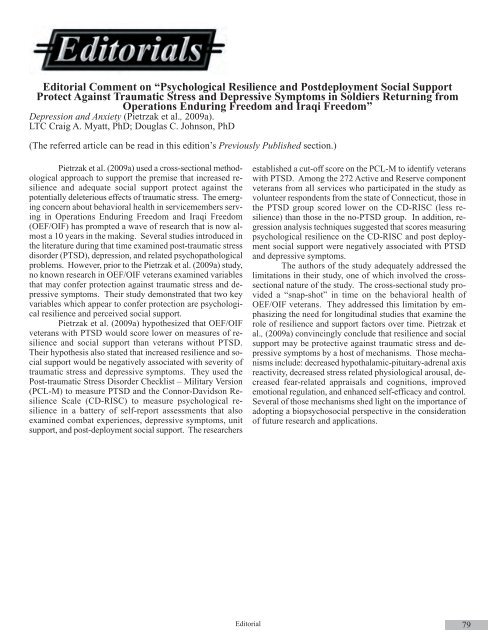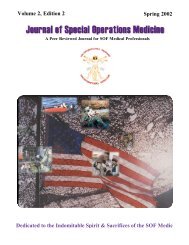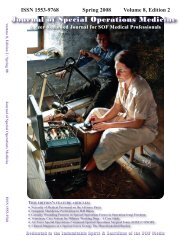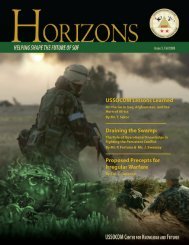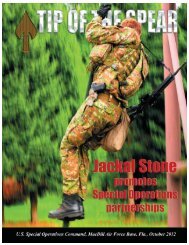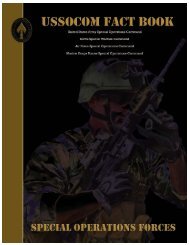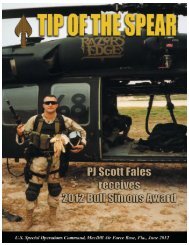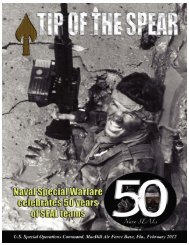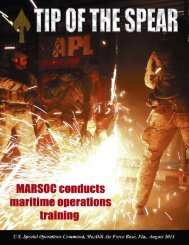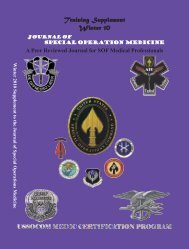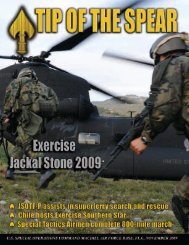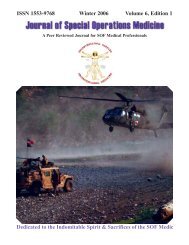Kaspersen, M., Matthiesen, S.B., Gotestam, K.G., 2003. Social networkas a moderator in the relation between trauma exposure and trauma reaction:A survey among UN soldiers and relief workers. Scand J Psychol.44, 415–423.King, L.A., King, D.W., Fairbank, J.A., Keane, T.M., Adams, G.A., 1998.Resilience-recovery factors in post-traumatic stress disorder among femaleand male Vietnam veterans: Hardiness, postwar social support, andadditional stressful life events. J Pers Soc Psychol. 74, 420–434.King, L.A., King, D.W., Vogt, D.S., Knight, J.A., et al., 2006. DeploymentRisk and Resilience Inventory: A collection of measures for studyingdeployment related experiences of military personnel and veterans.Mil Psychol. 18, 89–120.Kline, R.B., 2005. Principles and Practice of Structural Equation Modeling,2nd ed. The Guilford Press, New York, NY.Kroenke, K., Spitzer, R.L., 2002. The PHQ-9: A new depression diagnosticand severity measure. Psychiatry Ann 32, 509–521.Milliken, C.S., Auchterlonie, J.L., Hoge, C.W., 2007. Longitudinal assessmentof mental health problems among active and reserve componentSoldiers returning from the Iraq war. JAMA. 2298, 2141–2148.Muris, P., Schmidt, H., Lambrichs, R., Meesters, C., 2001. Protective andvulnerability factors of depression in normal adolescents. Behav ResTher. 39, 555–565.Oliver, L.W., Harman, J., Hoover, E., Hayes, S.M., Pandhi, N.A., 1999. Aquantitative integration of the military cohesion literature. Mil Psychol.11, 57–83.Oxman, T.E., Hull, J.G., 2001. Social support and treatment response inolder depressed primary care patients. J Gerontol Psychol Sci. 56, 35–45.Ozer, E.J., Best, S.R., Lipsey, T.L.,Weiss, D.S., 2008. Predictors of posttraumatic stress disorder and symptoms in adults: A meta-analysis. PsycholBull. 129, 52–73.Paykel, E.S., 1994. Life events, social support and depression. Acta PsychiatrScand. 377 (Suppl), 50–58.Sharkansky, E.J., King, D.W., King, L.A., Wolfe, J., Erickson, D.J., Stokes,L.R., 2000. Coping with Gulf War combat stress: Mediating and moderatingeffects. J Abnorm Psychol. 109, 188–197.Southwick, S.M., Vythilingam, M., Charney, D.S., 2005. The psychobiologyof depression and resilience to stress: Implications for prevention andtreatment. Ann Rev Clin Psychol 1, 255–291.Sumer, N., Karanci, A.N., Berument, S.K., Gunes, H., 2005. Personal resources,coping self-efficacy, and quake exposure as predictors of psychologicaldistress following the 1999 earthquake in Turkey. J TraumaStress. 18, 331–342.Tanielian, T., Jaycox, L.H., 2008. Invisible wounds of war: Psychologicaland cognitive injuries, their consequences, and services to assist recovery.The RAND Center for Military Health Policy Research, SantaMonica, CA.Tiet, Q.Q., Rosen, C., Cavella, S., Moos, R.H., Finney, J.W., Yesavage, J.,2006. Coping, symptoms, and functioning outcomes of patients withposttraumatic stress disorder. J Trauma Stress. 19, 799–811.Waysman, M., Schwarzwald, J., Solomon, Z., 2001. Hardiness: An examinationof its relationship with positive and negative long-term changesfollowing trauma. J Trauma Stress. 14, 531–548.Weathers, F., Huska, J., Keane, T., 1991. The PTSD Checklist MilitaryVersion (PCL-M). National Center for Posttraumatic Stress Disorder,Boston, MA.Zatzick, D.F., Marmar, C.R.,Weiss, D.S., Browner,W.S.,Metzler, T.J.,Golding, J.M., Stewart, A., Schlenger,W.E.,Wells, K.B., 1997. Posttraumatic stress disorder and functioning and quality of life outcomesin a nationally representative sample of male Vietnam veterans. Am JPsychiatry. 154, 1690–1695.AUTHORSa. National Center for Posttraumatic Stress Disorder, VA ConnecticutHealthcare System, West Haven, CT, USAb. Department of Psychiatry, Yale University School of Medicine,New Haven, CT, USAc. Naval Center for Combat and Operational Stress Control,Naval Medical Center and Department of Psychiatry, Universityof California San Diego School of Medicine, San Diego,CA, USAd. Department of Psychology, Central Connecticut State University,New Britain, CT, USAe. Department of Counseling and Family Therapy, Central ConnecticutState University, New Britain, CT, USA* Corresponding author — Department of Psychiatry, Yale UniversitySchool of Medicine, National Center for PTSD, VA ConnecticutHealthcare System, 950 Campbell Avenue/151E, WestHaven, CT 06510, USA. Tel.: +1 860 638 7467; fax: +1 203 9373481.E-mail address: robert.pietrzak@yale.edu (R.H. Pietrzak).78Journal of <strong>Special</strong> <strong>Operations</strong> Medicine Volume 9, Edition 3 / <strong>Summer</strong> 09
Editorial Comment on “Psychological Resilience and Postdeployment Social SupportProtect Against Traumatic Stress and Depressive Symptoms in Soldiers Returning from<strong>Operations</strong> Enduring Freedom and Iraqi Freedom”Depression and Anxiety (Pietrzak et al., 2009a).LTC Craig A. Myatt, PhD; Douglas C. Johnson, PhD(The referred article can be read in this edition’s Previously Published section.)Pietrzak et al. (2009a) used a cross-sectional methodologicalapproach to support the premise that increased resilienceand adequate social support protect against thepotentially deleterious effects of traumatic stress. The emergingconcern about behavioral health in servicemembers servingin <strong>Operations</strong> Enduring Freedom and Iraqi Freedom(OEF/OIF) has prompted a wave of research that is now almosta 10 years in the making. Several studies introduced inthe literature during that time examined post-traumatic stressdisorder (PTSD), depression, and related psychopathologicalproblems. However, prior to the Pietrzak et al. (2009a) study,no known research in OEF/OIF veterans examined variablesthat may confer protection against traumatic stress and depressivesymptoms. Their study demonstrated that two keyvariables which appear to confer protection are psychologicalresilience and perceived social support.Pietrzak et al. (2009a) hypothesized that OEF/OIFveterans with PTSD would score lower on measures of resilienceand social support than veterans without PTSD.Their hypothesis also stated that increased resilience and socialsupport would be negatively associated with severity oftraumatic stress and depressive symptoms. They used thePost-traumatic Stress Disorder Checklist – Military Version(PCL-M) to measure PTSD and the Connor-Davidson ResilienceScale (CD-RISC) to measure psychological resiliencein a battery of self-report assessments that alsoexamined combat experiences, depressive symptoms, unitsupport, and post-deployment social support. The researchersestablished a cut-off score on the PCL-M to identify veteranswith PTSD. Among the 272 Active and Reserve componentveterans from all services who participated in the study asvolunteer respondents from the state of Connecticut, those inthe PTSD group scored lower on the CD-RISC (less resilience)than those in the no-PTSD group. In addition, regressionanalysis techniques suggested that scores measuringpsychological resilience on the CD-RISC and post deploymentsocial support were negatively associated with PTSDand depressive symptoms.The authors of the study adequately addressed thelimitations in their study, one of which involved the crosssectionalnature of the study. The cross-sectional study provideda “snap-shot” in time on the behavioral health ofOEF/OIF veterans. They addressed this limitation by emphasizingthe need for longitudinal studies that examine therole of resilience and support factors over time. Pietrzak etal., (2009a) convincingly conclude that resilience and socialsupport may be protective against traumatic stress and depressivesymptoms by a host of mechanisms. Those mechanismsinclude: decreased hypothalamic-pituitary-adrenal axisreactivity, decreased stress related physiological arousal, decreasedfear-related appraisals and cognitions, improvedemotional regulation, and enhanced self-efficacy and control.Several of those mechanisms shed light on the importance ofadopting a biopsychosocial perspective in the considerationof future research and applications.Editorial 79
- Page 1 and 2:
Volume 9, Edition 3 / Summer 09 Jou
- Page 3 and 4:
An 18D deworms a camel during a “
- Page 5 and 6:
Field Evaluation and Management of
- Page 7 and 8:
The circumferential anchoring strip
- Page 9 and 10:
In doing so, all the skin is closed
- Page 11 and 12:
NATO SOF Transformation and theDeve
- Page 13 and 14:
current and future operations, thes
- Page 15 and 16:
sion of a physician, and limited pr
- Page 17 and 18:
REFERENCES1. James L. Jones, “A b
- Page 19 and 20:
This article is the first of two me
- Page 21 and 22:
Figure 4 : A Special Forces medic c
- Page 23 and 24:
exposure. Conversely, the customary
- Page 25 and 26:
7. Ted Westmoreland. (2006). Attrib
- Page 27 and 28:
first three days of injury, althoug
- Page 29 and 30:
9. Markgraf CG, Clifton GL, Moody M
- Page 31 and 32: the only sign of OCS may be elevate
- Page 33 and 34: E. The canthotomy allows for additi
- Page 35 and 36: 33. Rosdeutscher, J.D. and Stradelm
- Page 37 and 38: Tinnitus, a Military Epidemic:Is Hy
- Page 39 and 40: The development of chronic NIHL pro
- Page 41 and 42: supplied by diffusion. During expos
- Page 43 and 44: similar to those of other authors,
- Page 45 and 46: promising effect on tinnitus. Howev
- Page 47 and 48: ADDITIONAL REFERENCESHoffmann, G; B
- Page 49 and 50: et al. demonstrated that both right
- Page 51 and 52: TYPICAL CHEST RADIOGRAPH FINDINGS I
- Page 53 and 54: 11. Norsk P, Bonde-Petersen F, Warb
- Page 55 and 56: ABSTRACTS FROM CURRENT LITERATUREMa
- Page 57 and 58: tourniquet times are less than 6 ho
- Page 59 and 60: tal from July 1999 to June 2002. In
- Page 61 and 62: Operation Sadbhavana: Winning Heart
- Page 63 and 64: CENTRAL RETINAL VEIN OCCLUSION IN A
- Page 65 and 66: of the X chromosome. Notable is tha
- Page 67 and 68: AUTHORS*75th Ranger Regiment6420 Da
- Page 69 and 70: Casualties presenting in overt shoc
- Page 71 and 72: PSYCHOLOGICAL RESILIENCE AND POSTDE
- Page 73 and 74: spondents without PTSD (M = 4.6, SD
- Page 75 and 76: patients, whereas the mean score of
- Page 77 and 78: 29. Whealin JM, Ruzek JI, Southwick
- Page 79 and 80: average, time between return from d
- Page 81: ing functioning in both PTSD (Zatzi
- Page 85 and 86: Blackburn’s HeadhuntersPhilip Har
- Page 87 and 88: The Battle of Mogadishu:Firsthand A
- Page 89 and 90: Task Force Ranger encountered enemy
- Page 91 and 92: Peter J. Benson, MDCOL, USACommand
- Page 93 and 94: Numerous military and civilian gove
- Page 95 and 96: Anthony M. Griffay, MDCAPT, USNComm
- Page 97 and 98: This is a great read that speaks di
- Page 99 and 100: and twenty-eight. Rabies immune glo
- Page 101 and 102: Rhett Wallace MD FAAFPLTC MC SFS DM
- Page 103 and 104: LTC Craig A. Myatt, Ph.D., HQ USSOC
- Page 105 and 106: LTC Bill Bosworth, DVM, USSOCOM Vet
- Page 107 and 108: Europe, Mideast, Africa and SWAU.S.
- Page 109 and 110: SOF and SOF Medicine Book ListWe ha
- Page 111 and 112: TITLE AUTHOR ISBNCohesion, the Key
- Page 113 and 114: TITLE AUTHOR ISBNI Acted from Princ
- Page 115 and 116: TITLE AUTHOR ISBNRats, Lice, & Hist
- Page 117 and 118: TITLE AUTHOR ISBNThe Healer’s Roa
- Page 119 and 120: TITLE AUTHOR ISBNGuerilla warfare N
- Page 121 and 122: TITLEAUTHORBlack Eagles(Fiction)Bla
- Page 123 and 124: TITLE(Good section on Merrill’s M
- Page 125 and 126: GENERAL REFERENCESALERTS & THREATSB
- Page 127 and 128: Aviation Medicine Resources: http:/
- Page 129 and 130: LABORATORYClinical Lab Science Reso
- Page 131 and 132: A 11 year old boy whose tibia conti
- Page 133 and 134:
Meet Your JSOM StaffEXECUTIVE EDITO
- Page 135 and 136:
Special Forces Aidman's PledgeAs a


